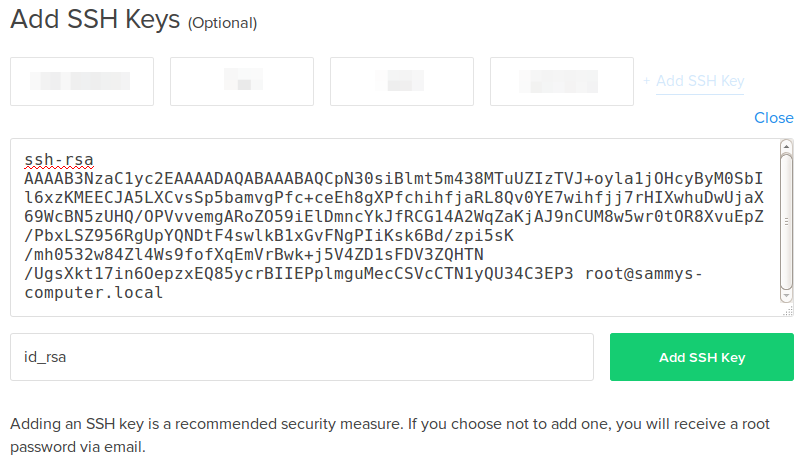Windows Generate Ssh Key Jenkins User
An SSH Key allows you to log into your server without needing a password. SSH Keys can be automatically added to servers during the installation process. autocad 2010 download for mac
- Jenkins Git Ssh Key
- Generate Ssh Key For Jenkins User Windows
- Windows Generate Ssh Key Jenkins User Login
- Generate Ssh Key For Jenkins User
Creating an SSH key on Windows 1. Check for existing SSH keys. You should check for existing SSH keys on your local computer. You can use an existing SSH key with Bitbucket Server if you want, in which case you can go straight to either SSH user keys for personal use or SSH access keys for system use. Open a command prompt, and run. First, you can generate an ssh key from any account. That account just has to be able to access the Jenkins user%USERPROFILE%.ssh folder. Ssh-keygen -t rsa -P ' -f C:USersJenkins Account.sshidrsa Second, use JENKINS SSH Credentials Plugin in order to register your private key, and register the public key to the GitHub repo you monitor. Tim Benke added a comment - 2016-11-02 20:27 If I understand the implementation correctly it starts an ssh agent, that any shell or batch script could use then. When I compare this with the usual Linux commands, I guess the ssh commands needs the environment variables to connect to the authentication socket and the agent's pid? User name - Enter the user name to use when signing in to the virtual machine on which Jenkins is running. The user name must meet specific requirements. Authentication type - Select SSH public key. SSH public key - Copy and paste an RSA public key in single-line format (starting with ssh-rsa) or multi-line PEM format. You can generate SSH keys. Anything.pub is the public key, which you could append to the user's /.ssh/authorizedkeys on any destination server. The other file, just called anything is the private key and therefore should be stored safely for the user. The default location would be username/.ssh/idrsa (here named idrsa, which is default for rsa keys).
Creating an SSH key on Windows
The simplest way to create SSH key on Windows is to use PuTTYgen. /forex-expert-advisor-generator-key.html.
- Download and run PuTTYgen.
- Click the 'Generate' button.
- For additional security, you can enter a key passphrase. This will be required to use the SSH key, and will prevent someone with access to your key file from using the key.
- Once the key has been generated, click 'Save Private Key'. Make sure you save this somewhere safe, as it is not possible to recover this file if it gets lost
- Select all of the text in the 'Public key for pasting into OpenSSH
authorized_keysfile'. This is what you would need to enter into the control panel to use the SSH key.
Jenkins Git Ssh Key
Creating an SSH key on Linux
The tools to create and use SSH are standard, and should be present on most Linux distributions. With the following commands, you can generate ssh key.
- Run:
ssh-keygen -t rsa. For a more secure 4096-bit key, run:ssh-keygen -t rsa -b 4096 - Press enter when asked where you want to save the key (this will use the default location).
- Enter a passphrase for your key.
- Run
cat ~/.ssh/id_rsa.pub- this will give you the key in the proper format to paste into the control panel. - Make sure you backup the
~/.ssh/id_rsafile. This cannot be recovered if it is lost.
Adding an SSH key to your control panel
- Once you're logged in, go to https://my.vultr.com/sshkeys.
- Click 'Add SSH Key'.
- Enter a descriptive name for the key.
- Paste in your SSH public key. This is a long string beginning with 'ssh-rsa'. You should have saved this from when you generated your key.
- Click 'Add SSH Key'.
- Now, when you're deploying servers you will be able to select which SSH keys you want to add to the newly deployed server. Remember to select the keys before the initial server deployment, otherwise you will need to log into the newly created server and add the SSH keys manually.

Limitations
- SSH keys are only available for Linux and FreeBSD. They are not supported for Windows, custom ISOs, nor snapshot restores.
- SSH keys can only be managed from the control panel during deployment. You cannot use the control panel to manage them on an already-installed instance.
Connecting to a server using an SSH key from a Windows client
Generate Ssh Key For Jenkins User Windows
- Download and run the PuTTY SSH client.
- Type the IP address or Username + IP address (
user@x.x.x.x) of the destination server under the 'Host Name' field on the 'Session' category. - Navigate to the 'Connection -> SSH -> Auth' category (left-hand side).
- Click 'Browse.' near 'Private key file for authentication'. Choose the private key file (ending in
.ppk) that you generated earlier with PuTTYgen. - Click 'Open' to initiate the connection.
- When finished, end your session by pressing
Ctrl+d.
Windows Generate Ssh Key Jenkins User Login
Connecting to a server using an SSH key from a Linux client
Generate Ssh Key For Jenkins User
- Check that your Linux operating system has an SSH client installed (
which ssh). If a client is not installed, you will need to install one. - Initiate a connection:
ssh -i /path/to/id_rsa user@x.x.x.x - When finished, end your session by pressing
Ctrl+d.